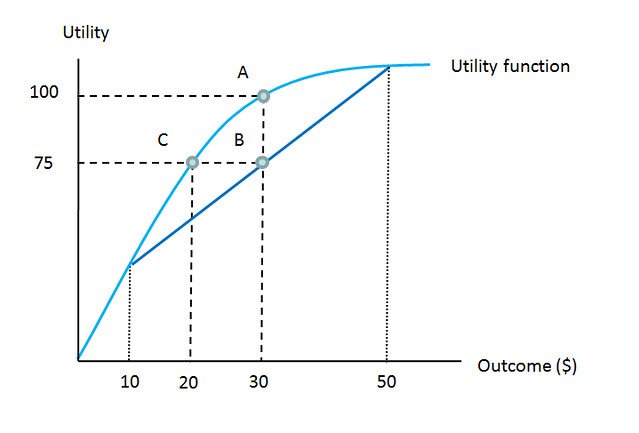Although maximizing personal benefit is the ultimate goal of an economizing individual, the utility value derived from the use of a certain service or product follows a general set of rules, based on the principles of organizational behavior.

Risk aversion was originally posted on Flickr by Global Water Forum and is reused here under the terms and conditions of the CC BY 2.0 DEED Attribution 2.0 Generic Creative Commons license
Expressed in terms of personal satisfaction, utility value may be high in the beginning, when an individual faces complete lack or shortage of a certain product or service. This situation translates into higher monetary sacrifice, which is willing to be undertaken by that individual, in order to obtain the desired good. In economic terms, that could be interpreted as an increase in demand, resulting in higher commodity prices.
There should be a point, the timing of which depends on the production possibility curve of a certain industry or economy, where consumers would start having a feeling of repletion, causing them to believe that those specific products or services are now of less utility value to them.
Therefore, it is clearly understood that the concept of utility value is totally subjective, depending on different circumstances faced by an individual, at particular instants. An extreme example could be given by the comparison of the utility value of, let’s say a gallon of water at the Niagara Falls, and the respective utility value in the middle of the Death Valley.
In the first scenario, where the said commodity is in abundance, its utility value is very low, since access to the desired commodity is easy, free, and almost in unlimited amounts. In the second case, though, the utility value of the commodity of water would be the highest possible, which is a fact justified by the total lack of water. The immediate consequence would be that, the difference in utility value is expressed by extremely low or extremely high prices – depending on the case – for exactly the same commodity.
As a conclusion, it can be argued that the utility value of a specific product or service depends on the intensity of the need faced by an individual consumer or group of consumers, in order to obtain, use, and enjoy that product or service, also taking into account the scarcity of the product or service in question.
Thank you, friend!


I'm @steem.history, who is steem witness.
Thank you for witnessvoting for me.
please click it!
(Go to https://steemit.com/~witnesses and type fbslo at the bottom of the page)
The weight is reduced because of the lack of Voting Power. If you vote for me as a witness, you can get my little vote.
Downvoting a post can decrease pending rewards and make it less visible. Common reasons:
Submit
You've got a free upvote from witness fuli.
Peace & Love!
Downvoting a post can decrease pending rewards and make it less visible. Common reasons:
Submit